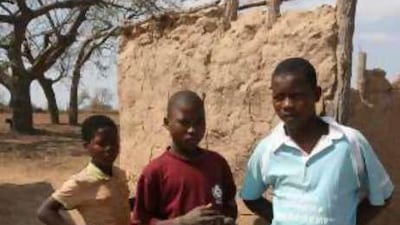NKAMBENI, SWAZILAND // Deep in the rolling, ochre hills of rural Swaziland, Celani Sifundza and his two siblings are blameless victims of a quiet cataclysm. The landlocked country has both the highest HIV infection rate in the world, at 38.8 per cent, and the lowest life expectancy, at just 31.99 years. First Celani's mother died of Aids, followed soon after by his father. After the funeral, the three orphans' two-room house was stripped of everything it contained, right down to their school books.
Now they rely on charity to survive, their one mattress, two blankets and three cooking pots all the result of donations. They have a two-hour run to go to school every morning, and with no running water in Nkambeni, they walk 30 minutes each way to fill containers with brownish liquid in the afternoons. This weekend Swaziland celebrated both the 40th anniversary of its independence from Britain and the 40th birthday of its ruler, King Mswati III, Africa's last absolute monarch. But Celani, 15, Menzi, 13, and Thembelihle, 11, did not take part. "I can't celebrate when I'm in this situation and don't have food to eat," said Celani, who wants to be a doctor when he grows up. "There's nothing we can say about it, we are not part of it. It's very terrible but there's nothing we can do, we have to cope."
The children are looked after by Thembi Manana, 40, who cooks for them in a mud-walled kitchen. She is HIV-positive herself and has been warned by her local clinic that they are running short of the antiretroviral drugs - which are free to users - she takes every day to stave off the progress of the illness. At the same time, the cost of the "40/40" celebrations, officially budgeted at around US$2.5 million (Dh9.18m) but estimated by critics to be far higher, has provoked unusual controversy, with demonstrations against them in the urban centres. "I'm very frustrated and I'm angry about it," said Ms Manana. "Right now there's nothing, yet people will be eating and celebrating. They should think about the people on the ground who don't have anything to eat."
Even so, Ms Manana wore a sarong emblazoned with a print of a youthful king. "We love the king," she said. "We like him very much, we just want him to meet our needs." Swaziland is an intensely traditional, respectful society, and in the SeSwati language the same word, nkosi, can be used to mean both 'God' and 'king'. Public criticism of the monarch himself is unthinkable for most Swazis, and akin to medieval Europe they prefer to blame his advisers - largely drawn from the sprawling royal family - for any problems. "According to the scripture, God says to us if you don't respect the king how are you going to respect me as a god that you don't see?" said Prince Musi Dlamini, a nephew of the ruler. "Swazi people are Christians, they listen to God, they respect God, that's how they respect the King. He is always there for the Swazi people. "It comes from the roots of the country where we grew up and learnt to respect his majesty." Underpinning the deference is a feudal system of land distribution. Most of it is owned by the king and administered on his behalf by traditional chiefs, who can strip troublemakers and their families of their holdings - with devastating consequences in a country where the vast majority are subsistence farmers. Worse yet is the sanction of expulsion from the community, which prevents an evictee from being buried with his ancestors, threatening his immortal soul. A general election is due later this month but political parties are not authorised by the constitution. For Barnes Dlamini, chairman of the Swaziland United Democratic Front, an umbrella opposition group, the authorities are now abusing traditional culture for reasons of self-preservation. "They are utilising that thing against change in Swaziland," said. "It's no longer about being an identification of the Swazi nation, it's about scoring political points." In the wake of the protests, which were accompanied by incidents of violence, Martin Dlamini, the editor of the independent Times of Swaziland newspaper - the royal surname is commonplace among the country's more prominent citizens - said that pressure for reform was growing, although there was no mechanism for it to happen without the king's backing. "It's very serious," he said. "Culturally you never stand up against the royalty and how they are spending their money, it's taboo. "A lot of people are saying it's about time this happened. There's no demonstration on the monarchy's side or the government that they are conscious of the poverty and social ills facing this country. They seem to be living in a world of their own. "Who does the cabinet report to at the end of the day? People report to the king - ministers feel all they have to do is make the king happy - and they are not accountable to the people," he added. Percy Simelane, the government's chief spokesman, admitted there were shortages of anti-HIV drugs in clinics, but said blaming 40/40 expenditures was misguided. "We have shortages of drugs but it's not because we have a shortage of money to buy them," he said, blaming distribution issues. "We do have the medication in our central stores. Government runs on people and people make mistakes." Critics, he said, "are saying we should democratise. I don't know what they are talking about. "The people of Swaziland put it in no uncertain terms that they were not ready for multi-partyism. They said they believe in direct representation." sberger@thenational.ae

